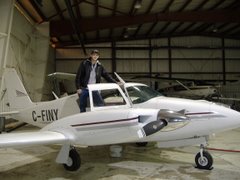I just recently met a friend of my girlfriend, who had been told by her that I was a pilot and that I was leaving for deployment again shortly. We talked for a bit and she mentioned that my girlfriend had told her I was a pilot, but she was confused because she didn't understand why I would be leaving for somewhere else for a long period. To her a pilot just flies back and forth from A to B, so there would be no need for me to leave for extended periods. It was an innocent assumption made by someone who isn't aware of all the different amazing things you can do with an aircraft. You could see the light come on as I explained the type of flying I do, and why it now made sense that I leave for extended periods
Its actually a fairly common scenario: Somebody asks what I do, and I tell them I'm a pilot. Invariably the next question is "Who do you work for?". I dislike that question, as I would guess at least 95% of every other pilot out there does - we've all had it. Its an innocent question, but the chances are that whoever is asking will have never heard of the company we work for. When they ask it, they're expecting one of three answers: Air Canada, Westjet, or Porter (or insert any other well known regional airline that is common to the area). But what they don't realize is that those airlines really only represent probably less than 10% of the entire pilot workforce in Canada, and unless whoever is asking actually works in the Aviation industry, I can guarantee they've never heard of the company that comes as the answer. So I think most of my fellow aviators including myself are expecting the blank stare that comes when we answer their question.
I still haven't figured out how to best explain what I do in a succinct, clear answer. How do you explain in one or two sentences in a casual conversation what I do as a low-level geophysical survey pilot?
Sometimes I also get the question "What do you fly?" This is a little better question to ask. At least if they don't know what a Piper Navajo is I can easily explain that its a twin engine propeller plane that normally holds about 8 people. That's enough information for most people to imagine something that's pretty close to a Navajo. When I flew the 206 that was even easier, because everyone knows what a Cessna is.
And then there's the "Are you still building hours to become an airline pilot?" I usually have fun explaining that I'd NEVER want to become an airline pilot. There's so many better and more interesting options to strive for than airline flying, at least in my opinion.
Its a shame that people equate airline flying as the only pinnacle to a successful flying career, and associate flying a small single engine piston plane with a low-experience entry level job. While those both can be true - a good airline job CAN be the pinnacle of a successful flying career and flying around a small single-engine piston is OFTEN for entry level pilots, its not always the case. Some airline pilot jobs are the lowest paying jobs in the industry, and some light piston plane jobs can require some of the highest most refined skill level of any pilot. Some good examples are the small speciality flying charter companies that operate in and out of super-short unimproved strips or ski-plane operations that take hunters into and out of half-thawed lakes. They may be flying the same aircraft that a low-time private pilot would be flying, but what they do certainly takes the skill of a high-time professional.
As Aviatrix mentions, a better question to ask after you find out that someone is a pilot is not who they work for but "What kind of operation is it?" That's a question that will impress us, and we'll also enjoy talking about it.
Subscribe to:
Post Comments (Atom)




Very interesting article Chad .
ReplyDelete